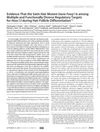The Disruption of Sox21-Mediated Hair Shaft Cuticle Differentiation Causes Cyclic Alopecia in Mice
May 2009
in “
Proceedings of the National Academy of Sciences
”
TLDR Disrupting the Sox21 gene in mice causes hair loss and regrowth cycles.
The study explored the role of the Sox21 gene in hair shaft cuticle differentiation using a mutant mouse model exhibiting cyclic alopecia, characterized by periodic hair loss and regrowth. Disruption of Sox21 led to defective hair shaft cuticle formation, compromising hair integrity and stability. Sox21 was identified as a master regulator of keratin and keratin-associated protein genes essential for proper hair shaft cuticle differentiation. The absence of Sox21 resulted in structural defects, causing the hair shaft to detach during the catagen stage of the hair cycle. Although no human mutations in Sox21 were reported, its expression in human hair shaft cuticles suggested potential implications for human hair loss conditions. The study underscored the importance of Sox21 in maintaining hair follicle integrity and suggested further research into its regulatory mechanisms and therapeutic potential for hair loss.




